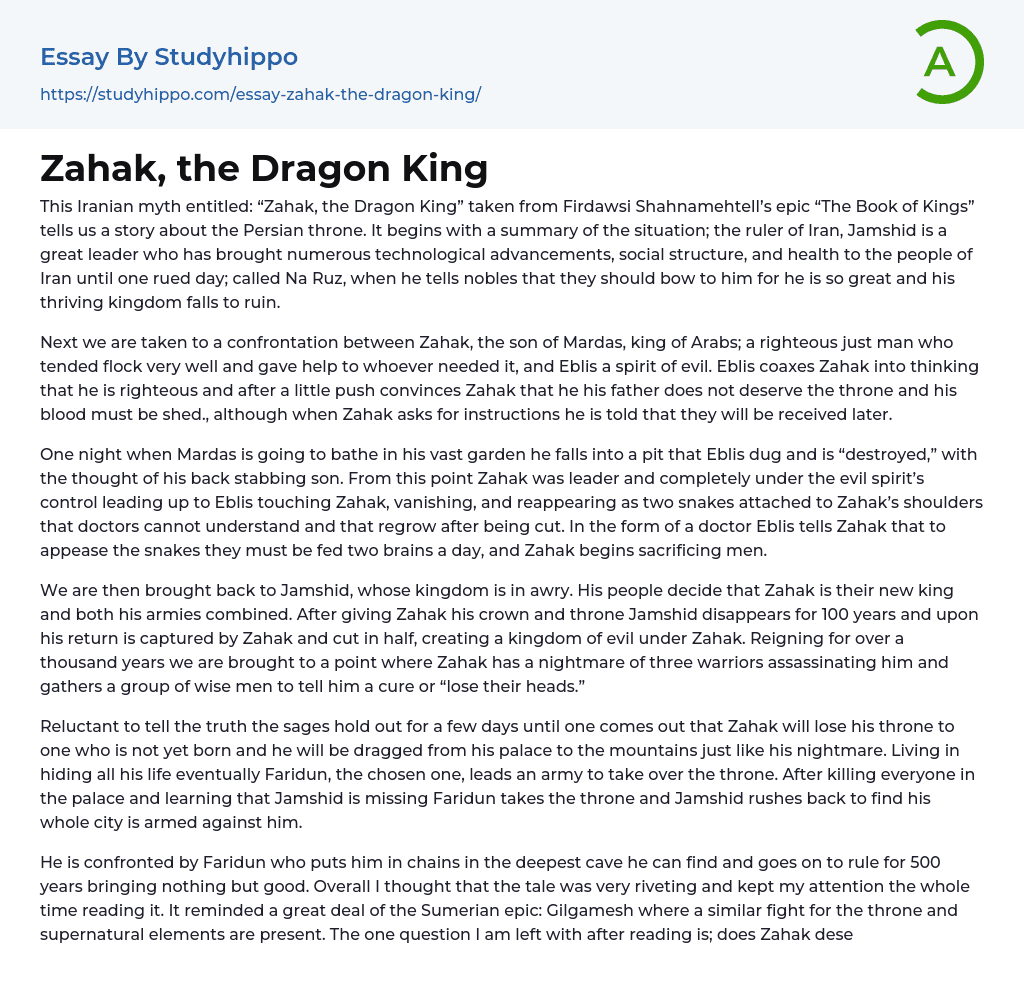The text below is aand unified version of the original text, preserving the and their contents:
Derived from Firdawsi Shahnameh's epic "The Book of Kings," the Iranian myth known as "Zahak, the Dragon King" tells the story of the Persian throne. It begins by providing an overview of the situation, portraying Jamshid, Iran's ruler, as an exceptional leader who brings technological advancements, social order, and improved health to his kingdom. However, everything changes on Na Ruz when Jamshid arrogantly demands that the nobles submit to him. As a result, chaos and disorder engulf his once-prosperous realm.
Next, Zahak, the son of Mardas, king of Arabs, renowned for his righteousness and dedication to his flock and assisting those in need, encounters Eblis, a malevolent spirit. Eblis deceives Zahak into perceivi
...ng himself as righteous and eventually persuades him that his father is undeserving of the throne and must be assassinated. Zahak requests additional guidance but is informed that it will be provided at a later time.
While about to bathe in his expansive garden one night, Mardas accidentally falls into a pit dug by his treacherous son Eblis. This leads to his downfall and the assumption of leadership by Zahak under the control of the malevolent spirit. Eventually, Eblis touches Zahak, vanishes, and then reappears as two snakes that attach themselves to Zahak's shoulders. These serpents possess an inexplicable ability to regenerate even after being severed. Disguised as a physician, Eblis informs Zahak that he must feed the snakes two brains every day in order to appease them. As a result, Zahak starts sacrificing men to fulfill this gruesome demand.
View entire sample
justify">
Jamshid's kingdom is in chaos, and his people choose Zahak as their new king, merging their armies. Zahak is given the crown and throne by Jamshid before the latter disappears for a century. When Jamshid returns, he is captured by Zahak, who cuts him in half. This action establishes a kingdom of wickedness under Zahak's rule. Zahak remains in power for more than a thousand years until he has a nightmare about three warriors plotting to assassinate him. Concerned, Zahak gathers a group of wise men to seek a cure or face dire consequences.
The sages are hesitant to disclose the truth, but eventually one of them predicts that Zahak will be overthrown by an unborn person. They foresee Zahak being forcefully removed from his palace and taken to the mountains, just like in his nightmare. Faridun, the chosen one, grows up in hiding and eventually leads an army to overthrow Zahak and seize the throne. After slaughtering everyone in the palace, Faridun realizes that Jamshid is not present. Faridun assumes power while Jamshid hurriedly returns only to find his entire city armed against him.
He is confronted by Faridun who places him in chains in the deepest cave he can find and proceeds to reign for 500 years, bringing only good. Overall, I found the tale to be highly captivating and engrossing throughout my entire reading. It bore a striking resemblance to the Sumerian epic known as Gilgamesh, where a similar struggle for power and supernatural elements are present. One lingering question I have after reading is whether Zahak should be punished, despite committing evil acts solely under the influence of Eblis.
- Culture essays
- Social Control essays
- Citizenship essays
- Social Justice essays
- Caste System essays
- Social Responsibility essays
- Socialization essays
- Deviance essays
- Modern Society essays
- Popularity essays
- Civil Society essays
- Community essays
- Female essays
- Filipino People essays
- Igbo People essays
- Indigenous Australians essays
- Indigenous Peoples essays
- Minority Group essays
- Social Institution essays
- Men essays
- The nation essays
- Middle Class essays
- Social Norms essays
- Discourse Community essays
- Popular Culture essays
- Car Culture essays
- American Culture essays
- Mormon essays
- Indian Culture essays
- Mexican Culture essays
- Pop Culture essays
- Cultural Differences essays
- Culture Shock essays
- Different Cultures essays
- World War I essays
- World War Ii essays
- Atomic Bomb essays
- American Civil War essays
- Attack essays
- Cold War essays
- Crimean War essays
- Emilio Aguinaldo essays
- Iraq War essays
- Korean War essays
- Nazism essays
- Nuclear Weapon essays
- Philippine Revolution essays
- Trench Warfare essays
- Vietnam War essays
- Western Front essays




